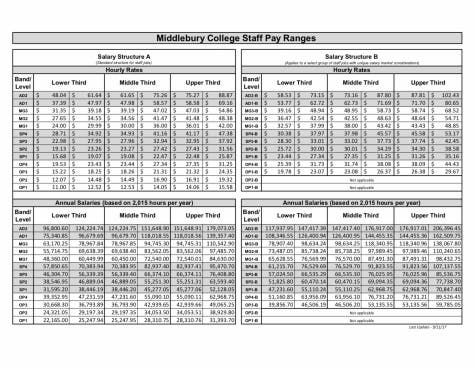As the college continues its process of workforce planning and prepares to review its compensation policies, issues surrounding staff compensation garner renewed attention.
For years, members of the college community have called for changes to the staff pay structure, particularly around low-wage positions. They remain concerned over the ability of staff to afford the costs of living in and around Middlebury, and the inability of departments that rely on these positions to fill job openings.

A sample of Middlebury's wage scale.
Staff pay follows a multi-tiered scale organized under two wage structures. Structure A applies to most staff positions, while structure B applies to jobs with competitive market conditions and comes with higher hourly wages.
Both contain four career bands: administrator, management, specialist, and operations. These bands are then divided into levels based on the amount of responsibilities associated with the job. At each level, staff can be paid within a certain range, broken up into three with minimum and maximum values shown for every third.
Jobs are categorized into one of these levels and compensated accordingly. For example, a floor crew custodian is paid at an Operations Level 2 (OP2) rate, with a minimum of $11.00 per hour in the lower third and a maximum of $15.58 per hour in the upper third.
Approximately 15 percent of staff, including custodians and dining hall servers, are paid at the OP1 and OP2 levels, the lowest of the bands. As the costs of living increases, many of these employees are finding it increasingly difficult to work at the college.
“I do think that the pay is low. I really do,” said a member of the custodial team. “It’s not keeping up with the cost of living, so a lot of people here work two jobs. It’s tough. Really tough,” he said.
All employees quoted in this article wished to remain anonymous for fear of retribution.
In a report published last year, the National Low Income Housing Coalition showed that a resident of Addison County would have had to earn an average of at least $19.63 per hour or work close to two full-time jobs at minimum wage to afford rent and utilities. The county is now the fifth most expensive in the state of Vermont.
[pullquote speaker="" photo="" align="center" background="on" border="all" shadow="on"]Nobody wants to come here, and when they do come here, they don’t stay.[/pullquote]
The experiences of staff members reflect the figure. “With rent and food, it’s hard to live here on the pay,” a second custodian said.
In response to these concerns, the administration has often cited generous benefits packages the college provides to full-time employees. With good insurance, retirement plans and even subsidized education for children, working at the college remains an attractive option compared to similar jobs in town. It’s a benefit that many members see as a critical part of their livelihoods.
“My friends in construction, they’re getting paid more. But they don’t have good insurance,” said a member of the facilities staff. “Several years ago, I had a medical issue, and that was a big deal.”
Others say that benefits are not enough. Staff earning close to minimum wage may be working from paycheck to paycheck — where money today means the difference between paying the phone bill or not.
“Your first year, you get five weeks time off. The health insurance is top-notch. But if you’re making 12 or 13 bucks an hour, what good does time off do?” asked a second member of the facilities department.
“[Time off] is useless because you can’t afford to go anywhere,” said the first custodian. “Might as well work.”
The level of pay is not only affecting the living conditions of staff, but also contributes to a shortage in certain departments on campus. Managers have struggled to fill open slots, with nine openings left unfilled in custodial positions.
It is a jarring change for college staff used to getting the help they need in order to fulfill the various demands of the expansive campus. A third employee in facilities recounted his first few years working at the college a decade ago, when custodial positions would be highly sought after.
“We would put out a help-wanted ad for floor crew and there will be 10, 12 job applicants,” he said. “You had to beg to get an interview here. And now you can’t drag ‘em in here,” the first custodial worker said.“Nobody wants to come here, and when they do come here, they don’t stay.”
Staff members speak of friends who have chosen to work in similar jobs in the state, foregoing better benefits for a slightly higher base pay. Listings for custodial positions in school districts around Burlington or Essex can start at $15 per hour with benefits, attracting people who in years past may have chosen to work at the college. Even jobs closer to home, including crew positions at Dunkin’ Donuts and cashier positions at the Natural Foods Co-op are paying wages close to what the college offers — around $12 per hour.
Broader trends outside of the college’s control have also exacerbated the issue. Low unemployment rates across the United States have led to a tight labor market where employers struggle to fill entry-level positions. At the end of last year, the unemployment rate in Addison County stood at 2.3 percent, one of the lowest since the Department of Labor began recording the data in Vermont.
Even when departments are able to hire, however, staff turnover remains an issue. Employees are discouraged by a perception that the administration fails to adequately reward good performance — a 2017 staff survey revealed that only 27 percent of faculty and staff were satisfied with the college’s recognition and awards programs.
Over the past five years, pay raises have hovered around two percent across the board, with few opportunities for merit-based rewards in lower-wage positions.
“I came in at the entry level, and now I’m at the top of the wage band. But it’s much harder for people to do that now,” said the first facilities employee, who has worked at the college for 25 years.
The first custodial worker shared the same sentiment. “If you screw off and I work hard, we get the same raise,” he said.
The administration, for its part, has responded to these concerns by launching a review of performance management processes, hoping to wrap up by the fall of 2020.
Still, many remain unconvinced that conditions will improve. “This used to be a great place to work. It still is, it still is," said the first custodial worker. "But it’s too bad."
For full staff issue coverage, click here.
Comments




